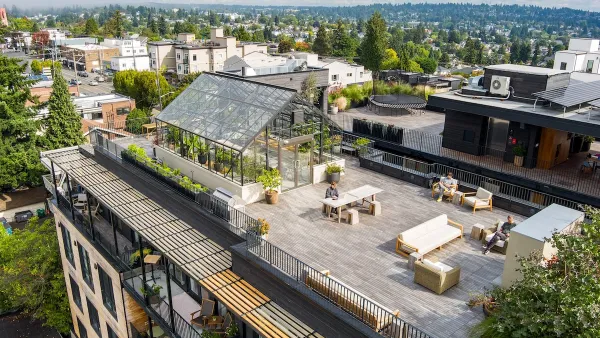Although denser is inherently greener, cities whose populations boom have their own set of challenges regarding sustainability. According to this article, achieving a balance between urban and rural growth is the most sustainable way to go.
"The Oregonian has a story about local academics who are participating in a national 'speak out' on population control this month. Says Jon Erlandson, a University of Oregon anthropologist, "...You can reduce your carbon footprint per person, yet if the population keeps growing you're making no progress." Oregon, despite the paradigmatic green urbanism of Portland, has experienced that dynamic:
From 1990 to 2004, the state succeeded in slightly reducing its per person carbon emissions, for example. But the overall level still rose - by 22 percent - the state says, thanks to 700,000 new residents.
Recycling rates have risen most years since 1992. But the amount of trash landfilled has still mostly gone up, despite state mandates to reduce it, with population growth and increased consumption to blame.
Metro, the Portland area's regional government, predicts the population of Portland and surrounding areas, including Clark County [WA], will about double by 2060, from about 2 million people to 4 million."
FULL STORY: Is Seattle's growth unstoppable?

Maui's Vacation Rental Debate Turns Ugly
Verbal attacks, misinformation campaigns and fistfights plague a high-stakes debate to convert thousands of vacation rentals into long-term housing.

Planetizen Federal Action Tracker
A weekly monitor of how Trump’s orders and actions are impacting planners and planning in America.

In Urban Planning, AI Prompting Could be the New Design Thinking
Creativity has long been key to great urban design. What if we see AI as our new creative partner?

King County Supportive Housing Program Offers Hope for Unhoused Residents
The county is taking a ‘Housing First’ approach that prioritizes getting people into housing, then offering wraparound supportive services.

Researchers Use AI to Get Clearer Picture of US Housing
Analysts are using artificial intelligence to supercharge their research by allowing them to comb through data faster. Though these AI tools can be error prone, they save time and housing researchers are optimistic about the future.

Making Shared Micromobility More Inclusive
Cities and shared mobility system operators can do more to include people with disabilities in planning and operations, per a new report.
Urban Design for Planners 1: Software Tools
This six-course series explores essential urban design concepts using open source software and equips planners with the tools they need to participate fully in the urban design process.
Planning for Universal Design
Learn the tools for implementing Universal Design in planning regulations.
planning NEXT
Appalachian Highlands Housing Partners
Mpact (founded as Rail~Volution)
City of Camden Redevelopment Agency
City of Astoria
City of Portland
City of Laramie





























